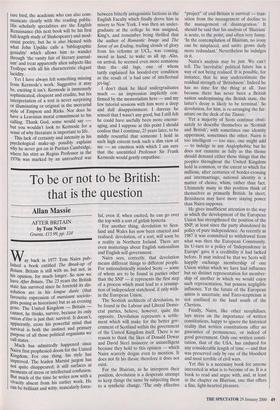To be or not to be British: that is the
question
Allan Massie
AFTER BRITAIN by Tom Nairn Granta, £15.99, pp. 324 Way back in 1977 Tom Nairn pub- lished a book entitled The Break-up of Britain. Britain is still with us, but not, in his opinion, for much longer. So now we have After Britain. The 23 years the British state has survived since he foretold its dis- solution are in his longue duree (that favourite expression of marxisant sociolo- gists posing as historians) but as an evening gone. The United Kingdom — Britain — cannot, he thinks, survive, because its only raison d'être is just that: survival. It doesn't, apparently, cross his powerful mind that survival is both the instinct and primary Purpose of all those political organisms we call states. Much has admittedly happened since Nairn first prophesied doom for the United Kingdom. For one thing, his style has unproved. The leaden Marxist jargon has not quite disappeared; it still surfaces at moments of stress or intellectual confusion. But much of the time he writes now with a vivacity absent from his earlier work. He eau be brilliant and witty, muscularly force- ful, even if, when excited, he can go over the top with a sort of girlish hysteria.
For another thing, devolution to Scot- land and Wales has now been enacted and realised; devolution, of a sort, will soon be a reality in Northern Ireland. There are even mutterings about English nationalism and English self-government.
Nairn sees, correctly, that devolution means different things to different people. For nationalistically minded Scots — some of whom are to be found in parties other than the SNP — it represents the first step of a process which must lead to a resump- tion of independent statehood, if only with- in the European Union.
The Scottish architects of devolution, to be found in the Labour and Liberal Demo- crat parties, believe, however, quite the opposite. Devolution represents a settle- ment which will make for the better gov- ernment of Scotland within the government of the United Kingdom itself. There is no reason to think the likes of Donald Dewar and David Steel insincere or unintelligent because they hold to this opinion — which Nairn scarcely deigns even to mention. It does not fit his thesis; therefore it does not exist.
For the Blairists, as he interprets their position, devolution is a desperate attempt to keep things the same by subjecting them to a synthetic change. 'The only effective "project" of end-Britain is survival — tran- sition from the management of decline to the management of disintegration.' It should be said that his analysis of `Blairism' is acute, to the point, and often very funny. 'In the contemplation of Blairism, no irony can be misplaced, and satire grows daily more redundant.' Nevertheless he indulges in it.
Nairn's analysis may be just. We can't tell. The 'inevitable' political future has a way of not being realised. It is possible, for instance, that he may underestimate the residual strength of 'Britishness'. Indeed he has no time for the thing at all. 'Just because there has never been a British nation underpinning the British state, the latter's decay is likely to be terminal.' So devolution, for him, is re-arranging the fur- niture on the deck of the Titanic.
Yet a majority of Scots continue obsti- nately to describe themselves as 'Scottish and British', with sometimes one identity uppermost, sometimes the other. Nairn is too intelligent — too nice, one might add — to indulge in any Anglophobia; but he does not examine as fully as this theme should demand either those things that the peoples throughout the United Kingdom hold in common, or the extent to which for millions, after centuries of border-crossing and intermarriage, national identity is a matter of choice, whim, rather than fact. Ultimately many in this position think of themselves as primarily British. In short, Britishness may have more staying power than Nairn supposes.
He gives insufficient attention to the way in which the development of the European Union has strengthened the position of the SNP, at least since the party abandoned its policy of pure independence. As recently as 1987 it was committed to withdrawal from what was then the European Community. Its U-turn to a policy of 'Independence in Europe' gave it a credibility it had lacked before. It may indeed be that we Scots will happily exchange membership of one Union within which we have had influence but no distinct representation for member- ship of another in which we would enjoy such representation, but possess negligible influence. Yet the future of the European union is uncertain; and Euro-scepticism is not confined to the land south of the Cheviots.
Finally, Nairn, like other neophiliacs, lays stress on the importance of written constitutions, happy to ignore the historical reality that written constitutions offer no guarantee of permanence, or indeed of good government. Only one written consti- tution, that of the USA, has endured for any considerable length of time — and that was preserved only by one of the bloodiest and most terrible of civil wars.
Yet this is a necessary book for anyone interested in what is to become of us. It is a book to read and argue with, and, at least in the chapter on Blairism, one that offers a fine, light-hearted pleasure.


















































































 Previous page
Previous page